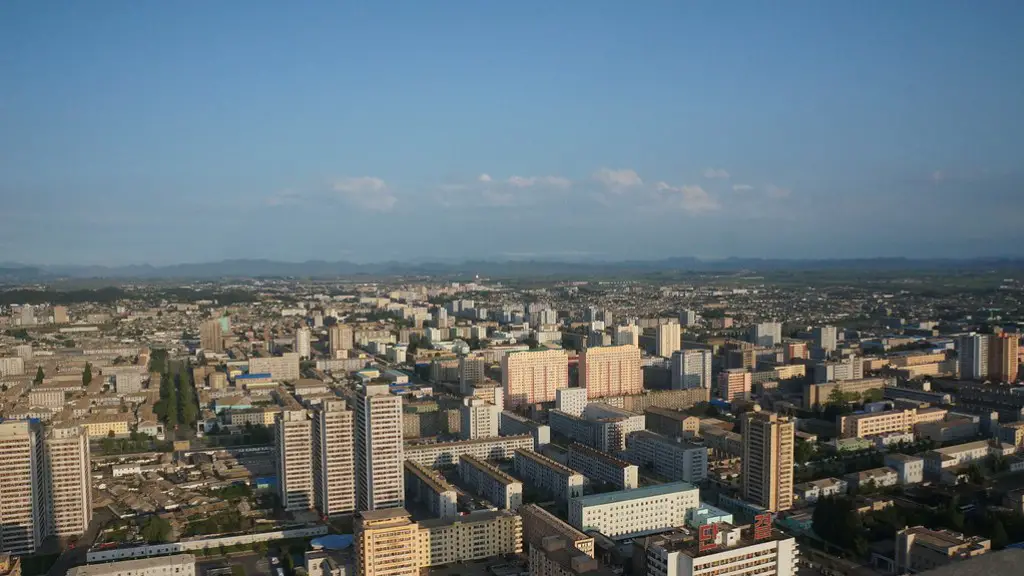Economic Integration
Reunited Korea would have access to a much larger, better-functioning economy. It already has the potential to be the fourth-largest economy in the world, but at the moment both North and South Korea remain highly divided. The South has one of the most vibrant economies in the world, driven by technology and a huge tourism industry, while the North remains a largely underdeveloped country with limited resources and production.
South Korean President Moon Jae-in has proposed an ambitious plan to bring the two countries together economically. His plan includes a special economic zone that would span the entire Korean peninsula. This economic zone would capitalize on the economies of both countries, generating investment, jobs and growth. The plan also includes a set of policies to encourage financial integration, including the opening of economic borders and the use of a common currency.
Experts agree that economic integration would be a major benefit for both countries. Improved trade relations would result in an increase in exports, more investment into the North and increased access to resources. This would help to reduce poverty and create jobs, setting the stage for sustainable development in both countries.
Political Reconciliation
The political future of a unified Korea is highly uncertain. Reunification would inevitably require changes in both countries’ political systems. This could include adopting a new Constitution, governance structure and election process. Even if changes are made, it is likely that there will remain some opposition and strong disagreements. North Korea’s current leadership is known to be highly resistant to change, and it is uncertain how these existing power structures would be merged.
However, many experts believe that the positive benefits of the reunification process would outweigh the negative consequences of the political transition. There would be a significant increase in stability, and a unified Korea would be better positioned to address international matters such as global warming, terrorism, and the denuclearization of the Korean peninsula.
On a more local level, a unified Korea could eventually become a role model for harmony among different nations, religions and cultures, fostering greater trust and cooperation. This would ultimately lead to greater political freedoms and help to build a strong nation out of two highly divided countries.
Social Unrest and Inequality
Social unrest and inequality between North and South Korea are some of the biggest obstacles in the way of reunification. Whilst South Korea does have a relatively large and wealthy middle class, the majority of North Koreans are living below the poverty line, dependent on state-subsidized rations and low wages. The difference in living standards between the two countries is stark, and if not managed effectively, could be a major issue in a united Korea.
The two countries also reflect different values and beliefs, and there are significant gaps in education and healthcare systems. Despite strong efforts by the South Korean government, North Koreans face decades of discrimination, as well as restrictions on their access to information and technology, which could lead to deep-rooted social tensions.
To overcome these issues, experts believe that a successful reunification process must include significant investments in infrastructure, education and healthcare. This would help to bridge the gap between the citizens of North and South, and ensure the process is fair and just for all.
Security Issues
As well as the social and economic obstacles, a unified Korea will have to address complex security issues. North Korea is currently armed with nuclear weapons and is known to be highly aggressive towards its southern neighbour.
Nuclear disarmament is a key issue and will undoubtedly be one of the most difficult challenges in this process. The security of the region is at stake and could be further complicated by the fact that South Korea and the United States both wield significant military might.
Experts believe that a unified Korea could eventually lead to a much more stable region. Whilst disarmament is difficult, it is possible if a comprehensive agreement can be implemented between all stakeholders. This could ultimately lead to the complete denuclearization of the Korean peninsula, which would be a major victory for international security and peace.
Opposition to Reunification
Reunification of the Korean peninsula is a controversial issue in both North and South, with strong opposition from both sides. In North Korea, there is a strong history of animosity towards the South and many North Koreans are still deeply committed to their own government’s ideology. In the South, there is a fear that reunification could be a drain on the South’s economy and could even lead to a takeover by the North.
Reunification requires a significant shift in attitudes and mindset, both within the Korean peninsula and internationally. The process may take many years, and it is important that the needs and concerns of both sides are addressed and respected. Part of this will involve a greater understanding of the history and culture of both countries, and how they are connected to each other.
International Support
Reunifying the Korean peninsula will require unwavering international support. Whilst South Korea has the resources and the capability to lead the process, it will require assistance from its major allies, including China and the United States. This assistance must go beyond political and economic assistance, and should also focus on diplomatic and cultural initiatives, such as exchange and cultural programs.
It is also necessary for the international community to establish clear goals for reunification. The process must be carefully structured and monitored, and should set out a roadmap for the future of the nation. This should involve increased collaboration with North and South, to ensure that the process is peaceful and successful.
Long-term Benefits
The reunification of the Korean peninsula would have long-term benefits for the region and the world. A united Korea would offer unparalleled economic stability and growth, as well as improved security and diplomatic relations with both the East and the West.
Ultimately, it is clear that both North and South Korea will benefit from reunification. Improved economic and political ties will lead to increased investment and better living standards, whilst the denuclearization of the peninsula and improved international ties will guarantee security and peace for generations to come. It is essential that the process is managed carefully and responsibly, with both sides recognizing the shared opportunity that a united Korea would bring.

